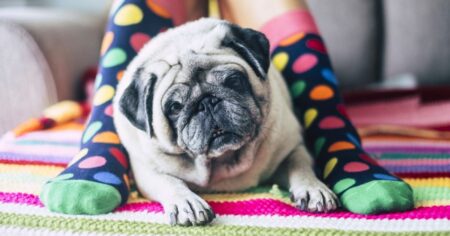As a pet owner, it can be concerning to see your beloved furry companion suddenly acting strangely. One common behavior that can be alarming is when your dog starts to act drunk and wobbly. This sudden change in their behavior can leave you wondering why it is happening and what you should do about it.
In this article, we will discuss the possible reasons behind this behavior and provide some guidance on what steps you can take to address it. Whether your dog’s wobbly and drunk-like behavior is due to a medical condition or something less serious, it is always important to pay attention and seek proper care to ensure the well-being of your canine companion. So, let’s explore the underlying causes and potential solutions for when your dog is acting drunk and wobbly suddenly.
My Dog Is Acting Drunk And Wobbly Suddenly: Why And What To Do
The why:
- Intoxication or poisoning: If your dog suddenly starts acting drunk and wobbly, it could be a sign of ingestion of toxic substances such as alcohol, medications, or household chemicals. These substances can affect the nervous system and cause disorientation and loss of coordination.
- Vestibular disease: This is a common condition in older dogs and can often lead to symptoms such as loss of balance, head tilt, and difficulty walking. It is caused by problems in the inner ear or brain, which can affect a dog’s sense of balance and coordination.
- Illness or infection: Certain illnesses or infections can affect a dog’s coordination and balance, causing them to appear drunk and wobbly. This could include conditions such as distemper, meningitis, or inner ear infections.
- Injury or trauma: If your dog has recently suffered from an injury or trauma to their head or body, it could lead to neurological abnormalities and affect their balance and coordination.
- Age-related changes: Just like humans, dogs can also experience age-related changes in their cognitive and motor abilities. Old age can lead to problems with balance and coordination, causing a dog to appear drunk and wobbly.
- Low blood sugar: A sudden drop in blood sugar levels can cause weakness and disorientation in dogs, leading to a wobbly gait and other behavioral changes.
- Heatstroke: If a dog is exposed to high temperatures for prolonged periods, it can lead to heatstroke, which can cause neurological symptoms and affect their coordination.
My Dog Is Wobbly And Off Balance All Of A Sudden
This could be a sign of a serious health condition, such as a stroke, head injury, poisoning, or a brain tumor. It’s important to take your dog to the vet as soon as possible so that they can determine the cause and provide appropriate treatment. Your vet will likely start by performing a physical exam and taking your dog’s medical history. They may also recommend diagnostic tests such as blood work, imaging, or a neurological exam. With prompt and appropriate treatment, many dogs can recover from these conditions and return to their normal, healthy state.
My Dog Is Wobbly And Flinching
If your dog is wobbly and flinching, it could be a sign of a neurological condition, such as vestibular disease, or an injury to the spine or head. Other possible causes include stroke, toxin exposure, or a tumor. It’s important to get your dog checked out by a vet as soon as possible, as some of these conditions can be serious and require immediate treatment. If the cause is not obvious, your vet may recommend further testing such as blood work, x-rays, or a CT scan. With the right treatment, your dog should be able to regain their balance and stop flinching.
Why Is My Dog Acting Drunk All Of A Sudden?
If your dog is acting drunk all of a sudden, it could be a sign of a serious health condition such as vestibular disease, brain tumor, or intoxication. Vestibular disease is a disorder of the inner ear that causes dogs to become dizzy and disoriented. Brain tumors can cause similar symptoms as well as seizures and behavioral changes. Intoxication can be caused by ingesting toxins such as alcohol, antifreeze, or certain plants. If your dog is acting drunk all of a sudden, you should take them to the vet right away for a diagnosis and treatment.
Why Is My Dog Walking Weird All Of A Sudden?
If your dog is walking weirdly all of a sudden, it could be a sign of a health issue like a spinal injury, neurological disease, or even a broken bone. It’s important to take your dog to the vet right away to get them checked out. Spinal injuries can cause dogs to walk funny by affecting their coordination and balance. Neurological diseases like degenerative myelopathy and cerebellar disease can also cause this symptom. A broken bone in the leg can cause a dog to limp or change their gait. Whatever the cause, it’s important to get your dog the care they need.
What Are Some Possible Causes Of Vestibular Dysfunction In Dogs?
- Infections or Inflammation: Dogs can develop infections in their ears or inflammation of the vestibular nerve, which can interfere with their balance and coordination. Infections can be caused by bacteria, yeast, or parasites, and can be triggered by allergies, injury, or foreign objects in the ear.
- Aging: As dogs get older, they are more prone to developing vestibular dysfunction due to changes in the delicate structures of the inner ear. This is known as geriatric vestibular syndrome and can cause sudden and severe vertigo and loss of balance.
- Head Trauma: Trauma to the head, such as a car accident or a fall, can damage the vestibular system and lead to vestibular dysfunction. This can also happen if a dog shakes its head vigorously or gets hit in the head with an object.
- Toxicity: Certain toxins, including some medications and chemicals, can affect the vestibular system and cause symptoms of vestibular dysfunction. This is especially true for dogs who accidentally ingest toxic substances or are exposed to them in their environment.
- Genetics: Some breeds, such as Cocker Spaniels and Beagles, are more prone to develop vestibular dysfunction due to genetics. They may have inherited structural or developmental abnormalities in their vestibular system that make them more susceptible to issues.
- Tumors: Benign or malignant tumors can develop in or around the vestibular system, causing pressure or damage to the delicate structures. This can lead to vestibular dysfunction and other neurological symptoms.
- Underlying Diseases: Certain medical conditions, such as hypothyroidism, Cushing’s disease, and kidney disease, can also cause vestibular dysfunction. These diseases can affect the vestibular system either directly or indirectly through changes in hormone levels or blood pressure.
- Idiopathic Causes: Sometimes, the cause of vestibular dysfunction in dogs cannot be determined. This is known as idiopathic vestibular syndrome and may be due to a combination of various factors or unknown reasons. It most commonly affects older dogs.
How Is Vestibular Dysfunction Treated In Dogs?
Vestibular dysfunction, also known as vestibular disease, is a common condition seen in dogs that affects the balance and coordination of the body. It can be caused by various factors such as inflammation, infection, trauma, or even old age. Symptoms of vestibular dysfunction in dogs can include loss of balance, head tilt, dizziness, and difficulty walking.
Treatment for vestibular dysfunction in dogs depends on the underlying cause and severity of the symptoms. Here are some ways in which veterinarians may treat this condition in dogs:
- Medications: If the vestibular dysfunction is caused due to an infection or inflammation, the veterinarian may prescribe antibiotics or anti-inflammatory drugs to reduce these symptoms. In some cases, vestibular dysfunction can be associated with nausea and vomiting, and medication may be prescribed to provide relief from these symptoms.
- Fluid therapy: In severe cases where the dog is unable to eat or drink due to dizziness or nausea, the veterinarian may administer fluids through intravenous (IV) therapy to prevent dehydration and maintain the dog’s energy levels.
- Supportive care: Dogs with vestibular dysfunction may have difficulty standing and walking, making it difficult for them to perform daily activities such as eating, drinking, and going to the bathroom. In such cases, supportive care may be necessary to help the dog with these tasks. This can include providing soft and easily digestible food, supportive slings to help the dog stand, and assistance with toileting.
- Physical therapy: Physical therapy can help improve the dog’s balance and coordination and strengthen the muscles needed for standing and walking. This may include exercises to improve head and body control, and walking on different surfaces to improve the dog’s ability to adapt to changing environments.
- Nutritional supplements: In some cases, dogs with vestibular dysfunction may also benefit from nutritional supplements containing antioxidants and essential fatty acids. These supplements can help improve nerve function and assist in the healing process.
- Rest: Rest is a crucial aspect of treating vestibular dysfunction in dogs. Dogs with this condition may require a quiet and calm environment to help them feel less dizzy and nauseous. The veterinarian may recommend reducing stimulation by keeping the lights dim and minimizing loud noises.
In most cases, vestibular dysfunction in dogs resolves on its own within a few weeks or months. In some older dogs, however, the condition may become chronic, and they may require long-term management of symptoms.
SEE ALSO: 40 Surprising Facts About Our Feline Friends
What To Do If Your Dog Is Acting Drunk And Wobby Suddenly
- Stay Calm: The first thing to do if you notice your dog is acting drunk and wobbly is to remain calm and avoid panicking. It’s normal to feel worried, but panicking can make the situation worse.
- Observe Your Dog: Take a closer look at your dog’s behavior and try to identify what could have caused this sudden change. Has your dog ingested any toxic substances or has he been playing too hard?
- Check for Physical Injuries: If your dog’s behavior appears uncoordinated and wobbly, it could be a sign of physical injury. Carefully check your dog for any signs of injuries or pain, such as limping or sensitivity to touch.
- Check for Other Symptoms: Apart from wobbly movement, make sure to check for other symptoms such as vomiting, diarrhea, loss of appetite, or excessive drooling. These could be indications of a more serious underlying issue that requires immediate attention.
- Contact Your Veterinarian: If you notice any concerning symptoms, it is vital to contact your veterinarian right away. They will be able to provide proper medical advice or recommend a visit to their office if necessary.
- Keep Your Dog Hydrated: If your dog is acting drunk and wobbly, make sure to keep them hydrated by offering fresh water. This will help prevent dehydration, which can worsen their condition.
- Limit Activity: Limit your dog’s activity and movement to prevent any further injuries or accidents. Try to create a calm and quiet environment for them to rest and recover.
- Monitor Your Dog’s Condition: Keep a close eye on your dog’s condition and behavior. If their symptoms persist or worsen, seek immediate veterinary attention.
- Follow Any Recommended Treatments: If your veterinarian has prescribed any medication or treatment plan for your dog, make sure to follow it carefully. This will help them recover faster and prevent any complications.
- Prevent Future Incidents: Take steps to prevent similar incidents from happening in the future. This could mean keeping toxic substances out of reach, supervising your dog closely during playtime, or seeking professional help for any behavioral issues.
When To See A Vet For A Drunk Dog
If your dog is acting drunk, it’s important to see a vet as soon as possible. While it’s possible that your dog just had too much to drink, it’s also possible that they’re experiencing a serious medical condition. Some of the symptoms that you should look out for include vomiting, diarrhea, loss of appetite, lethargy, difficulty breathing, tremors, or seizures. If your dog is showing any of these symptoms, it’s important to get them to the vet right away. Drunkenness can be caused by many things, such as toxic ingestion, liver disease, and even brain tumors.
SEE ALSO: My Dog Wants To Play After Eating: Why And What To Do
FAQs
Q. What to do if my dog is acting drunk?
A. If your dog is acting drunk, it’s important to stay calm and assess the situation. First, determine if they may have gotten into anything they shouldn’t have, like food or alcohol. If you think your dog may have ingested something toxic, call your veterinarian or the ASPCA Poison Control Hotline immediately. Next, try to determine if they’re experiencing any other symptoms like vomiting, diarrhea, or lethargy. It’s also important to note if they’ve been acting strangely for an extended period, or if it’s a sudden behavior change. Then, based on your assessment, contact your veterinarian or emergency clinic.
Q. How can I help my wobbly dog?
A. If your dog is wobbly, there are a few things you can do to help. First, make sure they have a safe, quiet place to rest and recover. Keep an eye on them to make sure they’re not falling or bumping into things, and try to limit their activity. You can also help by providing them with plenty of fresh water and food and monitoring their appetite.
Q. Why is my dog acting weird and stumbling?
A. There are a few reasons why your dog may be acting weird and stumbling. It could be something as simple as an inner ear infection, or as serious as a neurological disorder. If your dog is stumbling, it’s important to rule out the most common causes first. Start by checking their ears for signs of infection, and then move on to neurological tests if the infection is ruled out. If your dog has a neurological condition, you’ll need to work with your veterinarian to determine the best course of treatment. In the meantime, try to keep them as comfortable as possible and make sure they’re not injuring themselves.
Conclusion
In conclusion, if your dog is suddenly acting drunk and wobbly, it could be a sign of a serious medical condition or it could be a result of something more minor like an injury, medication, or ingestion of toxic substances. It is important to closely observe your dog’s behavior and monitor any other symptoms they may be experiencing. Consulting with a veterinarian is recommended to determine the underlying cause and proper course of action.
Additionally, taking precautionary measures such as keeping your dog away from potential hazards and providing a safe and comfortable environment can help prevent such episodes in the future. Remember, the health and well-being of your dog should always be a top priority, and seeking professional help is crucial in ensuring their overall health and happiness.


